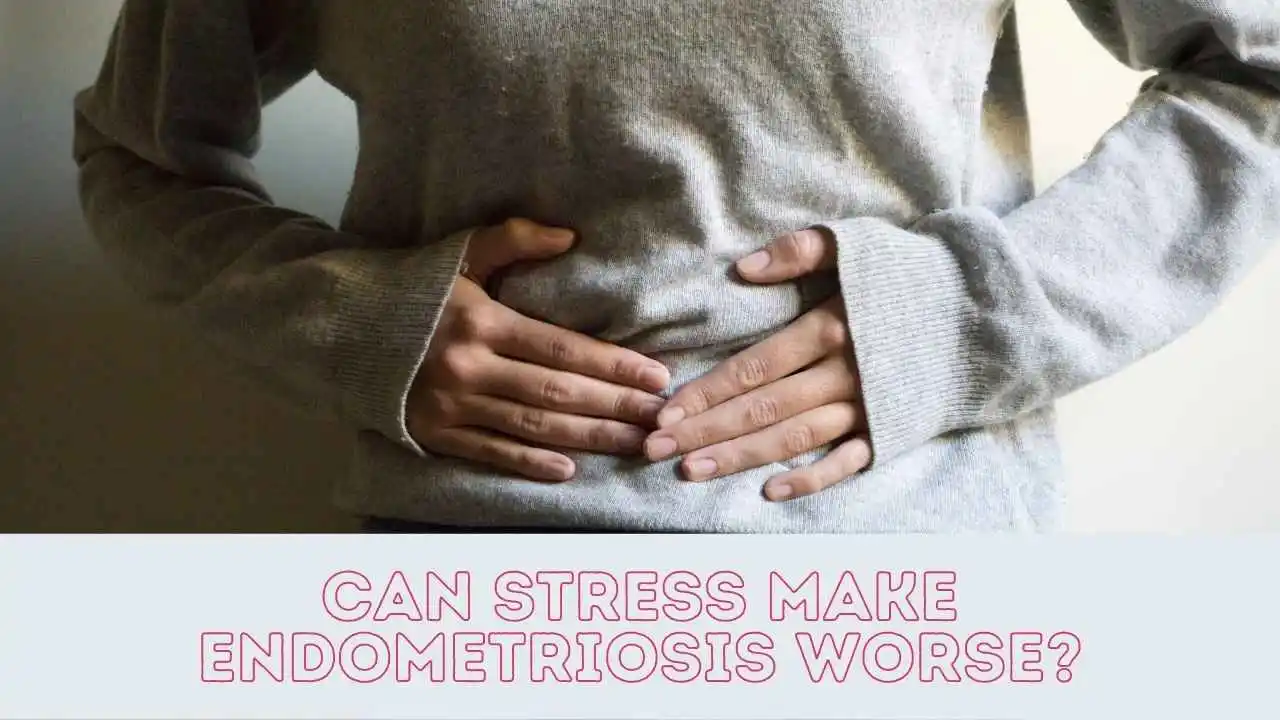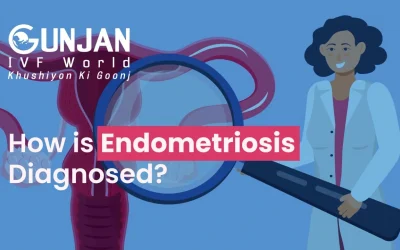Overview
Everyone gets stressed at some point in their lives. Stress may manifest as symptoms such as tenseness, anxious thoughts, and shifts in mood. Excessive tiredness, digestive problems, and discomfort are possible side effects of chronic stress.
For many women, it is difficult to determine the link between stress and the development of endometriosis. Stress, according to some studies, might exacerbate symptoms. A chronic illness like endometriosis may also be distressing. Stress-inducing factors include chronic pain, recurrent flare-ups, and difficulties conceiving a child.
Chronic stress may harm your physical and emotional well-being if left unchecked. It is estimated that half of those affected with endometriosis also suffer from anxiety or despair.

What is endometriosis?
When endometrial tissue grows outside of the uterus, it’s known as endometriosis, a condition in which the uterus grows irregularly. Menstruation causes the endometrial tissue to be lost monthly.
Endometrial implants are areas of endometrial tissue present in ectopic sites. The fallopian tubes, the ovaries, the bowel, the surface of the uterus, and the membrane lining of the pelvic cavity (i.e. the peritoneum) are the most prevalent sites for these lesions. The bladder, cervix, and vagina are less often affected.
Endometriosis may sometimes spread beyond the uterus. Endometriosis has been found in the brain, liver, lungs, and scars from previous surgeries.
While endometrial implants might cause problems, they are generally benign (i.e. non-cancerous).
20+ Years Of Experience as Fertility Specialists
20 Years Of Experience as a Fertility Specialists
National Fertility Awards 2023
Call Us
+919990044555
Causes
The exact cause of endometriosis is currently unclear. A theory states that part of the tissue is pushed up via the fallopian tubes into the stomach during a menstrual period, where it connects and develops. This is known as reverse menstruation.
Endometrial tissue might migrate via blood or lymphatic vessels, similar to how cancer cells grow. According to a third hypothesis, any cell may become an endometrial cell at any time.
Endometriosis may also be caused via direct transplantation, such as in the abdominal wall after a caesarean section. As a result, some people may be genetically susceptible to the illness.
Connection between stress and endometriosis
Your bodies have a well-coordinated mechanism to deal with sudden, short-term stresses. It’s also referred to as the fight, flight, or freeze reaction, and it’s designed to assist you in dealing with temporary stressful circumstances.
With prolonged, untreated stress, this reaction might harm the body over time.
The gut microbiota may be influenced by stress. Bacteria live in and on your bodies in diverse colonies. It’s referred to as the microbiome. The digestive system is home to the majority of the microbiome.
The composition of beneficial bacteria in the stomach may be disrupted by stress. Dysbiosis is the term for this kind of imbalance.
Some inflammatory disorders, such as endometriosis, are linked to dysbiosis, but it’s unclear which arises first. Dysbiosis might be caused by endometriosis inflammation. Dysbiosis may also trigger inflammation, which promotes the formation of endometriosis.
The gut microbiota is also hypothesised to be involved in oestrogen metabolism. Endometriosis development is promoted by elevated oestrogen levels, according to research. Dysbiosis may increase the quantity of oestrogen in the body.
Read Also – How Serious Is Endometriosis?
Book An Appointment
Follow Us On
How to remain stress-free
No matter how hard you try, stress will always be a part of your life. That’s why it’s crucial to learn how to deal with and adjust to your mind and body pressures. This makes your body recover to a more calm condition after a stressful situation.
Endometriosis may be managed with the aid of these stress management techniques.
Exercise
Being physically active may lift your spirits and alleviate stress. Inflammation in the body may also be reduced by exercise. Physical therapy may be able to help you develop a fitness regimen that works for you.
Yoga
In India, yoga is a centuries-old discipline. There are many other postures, stretches and breathing exercises that go along with this exercise.
Yoga has several health advantages. It aids in increasing stamina, range of motion, and calmness. Stress and anxiety may be effectively reduced via the practice of yoga. Endometriosis-related persistent pelvic discomfort may benefit from it as well.
Meditation
To be mindful is to be present in the here and now. Anxiety, stress, and sadness may all be reduced with mindfulness techniques.
Here are some basic methods to begin with mindfulness:
- Deep breathing and concentrating on your breath is a great way to get into the habit of taking deep breaths.
- Close your eyes and relax. Observe what you feel around yourself.
- Begin from the bottom and gradually increase. Keep an eye on your feelings as you go.
- Relax for a few moments. When you’re thinking about something, write it down.
- Concentrate on the immediate surroundings.
FURTHER READING
Conclusion
Stress and endometriosis are intertwined. Endometriosis is a chronic ailment that may cause stress and difficulty coping. Stress is also known to worsen endometriosis symptoms by increasing inflammation in the body.
Endometriosis symptoms may be alleviated by reducing stress. Options like yoga, meditation, and exercise might be useful. Take advantage of the opportunity to learn new stress management techniques from a therapist.
Gunjan IVF World offers a wide range of treatment options, surgical procedures, and medical therapies to ensure the health and well-being of our patients. Our highly qualified and experienced gynecologists have helped hundreds of women manage their endometriosis symptoms and regain a healthy lifestyle.
One of the best endometriosis doctors in Delhi, India, practices with us. Get in touch with our specialist if you have concerns about endometriosis and its complications!
Share this with
Related Blogs
Natural Remedies For Endometriosis
Overview Endometriosis is a condition in which the tissue that lines the uterus (endometrium) grows outside of the uterus. This can cause pain, inflammation, and scarring. Endometriosis most commonly affects women of childbearing age, but it can occur at any age....
How is Endometriosis Diagnosed ?
Overview The endometrium is the tissue that lines up in the wall of the uterus. After every twenty-eight days, this tissue breaks down and bleeds as menstrual blood. The problem is the Endometriosis tissue also behaves like normal tissues. But when you have...
Follow Us On
About Author









